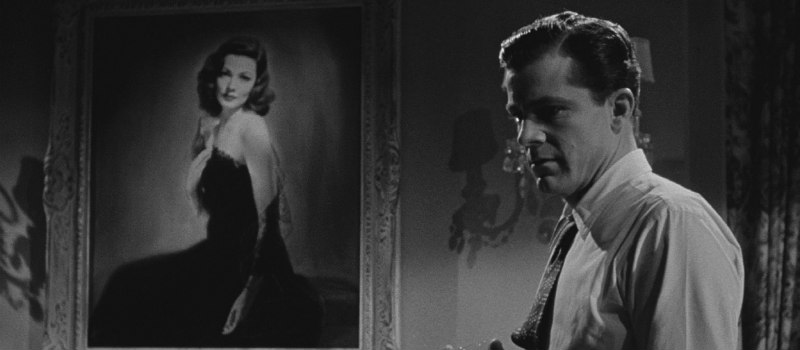
Review by Eric Hillis
Directed by: Otto Preminger
Starring: Gene Tierney, Dana Andrews, Clifton Webb, Vincent Price, Judith Anderson

The trouble with detective thrillers is that detectives rarely make for very effective thriller protagonists. With the odd exception like Elliott Gould's Philip Marlowe in Robert Altman's The Long Goodbye, screen detectives tend to be alpha males, at once the smartest and toughest guy in the room, and it's difficult to coerce the viewer into a state of nail-biting dread when the hero is so powerful (the same problem dogs today's superhero movies). You never fear for the well-being of Humphrey Bogart's Marlowe in the same way you do Gould's, yet The Big Sleep is still one of the most entertaining movies to ever come out of Hollywood. As detective thrillers don't work very well as thrillers, they need to make up for this deficit in other areas. They need to boast witty dialogue with lines that will have you reaching for a notepad in order to quote them to friends at a later point. They need to feature a supporting cast of larger than life characters. They need to be visually compelling, through shadowy lighting, clever camerawork and striking costumes. And perhaps most of all, they need to star an actress seductive enough for the viewer to believe the male protagonist is willing to act irrationally to obtain her affection. Because Howard Hawks' The Big Sleep ticks all these boxes, it allows us to forgive the lack of a relatably vulnerable hero. The same applies to Otto Preminger's Laura.
The detective protagonist here is Dana Andrews' Mark McPherson, a police dick called in to investigate the murder of Laura Hunt (Gene Tierney), a beautiful and much beloved socialite whose brains were blown out in the doorway of her Manhattan apartment.

McPherson has seen it all in his line of work, and isn't particularly emotionally involved in this case. In a nice character touch that gives the 1944 film some modern relevance, McPherson is addicted to a handheld game, which he plays while half-heartedly questioning suspects. His attitude changes when he enters Laura's apartment and gazes at the portrait of the woman, a painting which begins to haunt him.
One of the chief suspects, newspaper columnist Waldo Lydecker (Clifton Webb), accompanies McPherson as he questions an array of Laura's associates, and through his fond recollections of the young woman he adds to the mystique in the smitten detective's mind.
As the embittered, misanthropic and egotistical Lydecker, Webb is the MVP of Preminger's film. Every caustic line that comes out of his mouth is a zinger, and it's difficult to believe he wasn't the inspiration for Jack Nicholson's grouchy writer in James L. Brooks' As Good as it Gets.

Through flashbacks we learn how Lydecker became infatuated with Laura, but what makes his obsession so fascinating is that it transcends any sexual attraction. Unlike McPherson, who falls in love with the mere image of Laura without ever having met her, Lydecker (who we have to assume is gay, though of course a 1944 film couldn't explicitly state such a thing) falls for the woman he believes she can become. Taking her under his wing like a Manhattan Henry Higgins, Lydecker shapes Laura into the embodiment of New York WASP sophistication. When handsome young suitors (including Vincent Price, still in his days of portraying affable lugs yet betraying the sinister side he would soon explore with legendary results) come calling, Lydecker has them summarily dismissed with damaging words in his column. It's not out of any romantic envy (though he may be jealous that he can't attract such men himself), but because he believes in old world ways and doesn't want Laura spoiled by modern vulgarity.
This contrast between the intentions of McPherson and Lydecker towards Laura is what makes Preminger's film so fascinating, far more than the plot, which becomes rather mundane once the mid-point twist is revealed. Tierney is ideally cast as the object of their desires, the sort of woman every straight man wants to bed and every gay man wants to take shopping.

Much like Hawks, Preminger's direction is largely invisible, but his camera always happens to be in the right place and he does occasionally pull off a striking camera move like the whip pan that sets off a climactic suspense sequence. Composer David Raksin's repeated theme substitutes for the ghost of the eponymous victim, creating the sense that she's present in every scene, while Joseph LaShelle's Oscar-winning cinematography becomes more recognisably noirish as the plot progresses towards its violent conclusion.
Laura has influenced many filmmakers, none more so than Alfred Hitchcock - Vertigo's protagonist, Jimmy Stewart's Scottie Ferguson, is a curious amalgamation of both McPherson and Lydecker in his infatuation with a beautiful corpse - and David Lynch, whose Twin Peaks contains several nods to Preminger's film. Yet it's a movie that seems to have lost its place in the noir canon in recent decades. Perhaps Eureka's immaculately presented blu-ray will restore it to its rightful standing.

Extras:
Eureka's disc gives you the option to play the original theatrical release or the extended cut; two feature commentaries, one by film historian Rudy Behlmer, the other by composer David Raksin and film professor Jeanine Basinger; three radio adaptations of the film; an interview with Raksin; a featurette with contributions from a variety of film scholars and One False Move director Carl Franklin; and a collector’s booklet featuring a new essay by Phil Hoad, alongside a selection of rare archival imagery.

Laura is released on blu-ray January 14th by Eureka Entertainment.
